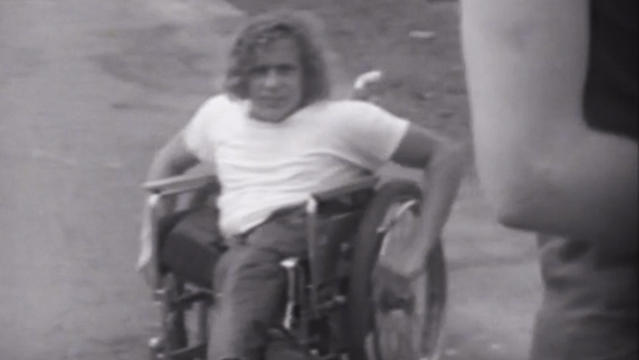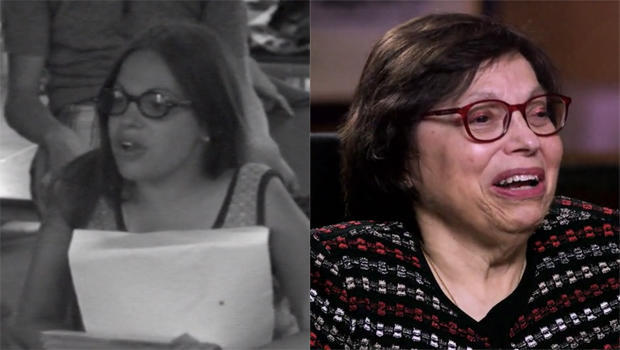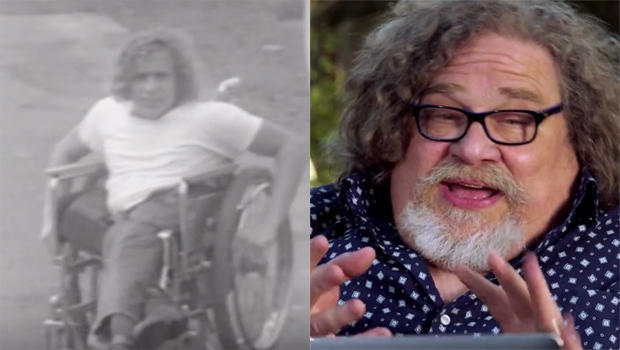▶ Watch Video: “Crip Camp” and the disability rights movement
It is an unexpected sight: all kinds of kids with all kinds of disabilities at summer camp having the time of their lives. The year was 1971. The place: Camp Jened, in New York’s Catskill Mountains.
Jim Lebrecht, born with spina bifida, was one of the campers: “Wow, Camp Jened was a place that was a utopia,” he said. “It was a place where all of a sudden the rest of the outside world seemed to just disappear.”
Judy Heumann, who got polio at 18 months old, was a counselor there: “I really laughed when I saw the film – it was so funny to see me at 21!”
And we are seeing this old footage now as part of a recent documentary, called “Crip Camp” … short for the word “crippled,” which, let’s face it, is not bandied about these days.
Correspondent Rita Braver asked LeBrecht why he chose to call the film “Crip Camp”: “We wanted to basically let people know that this wasn’t your average film about disability, that there was an edge,” he replied.
Lebrecht is not only a major character in “Crip Camp”; he is also one of the filmmakers, collaborating with Emmy Award-winning documentarian Nicole Newnham. “Jim made me see disability is a culture,” she told Braver. “He made me see disability as a community.”
Lebrecht vividly remembered this Camp Jened footage, made by a free-wheeling, experimental group called People’s Video Theater, who invited campers to speak freely about their lives. They captured Camp Jened kids revealing some of their most personal feelings, including “what everybody wants, to be alone sometimes in their life.”
In lighter moments, Lebrecht got to shoot video himself with a camera strapped to his wheelchair.
But LeBrecht had no idea what had become of the video after almost half a century
Newnham said, “That was just incredibly enticing to me as a filmmaker. It felt like it would be the holy grail. I just spent night after night looking online.”
She finally found it, and the footage became the starting point for the rest of the Netflix documentary, a project that attracted the Obamas as executive producers: “They really were creative partners,” Newnham said.
Some of the campers, especially Judy Heumann, would become leaders in the disability rights movement. Newnham remarked, “You don’t get to see footage of our great civil rights heroes at summer camp.”
Heumann founded a group called Disabled in Action, which conducted street demonstrations. “It was very important for all of us that we wanted people to see us,” she said.
Braver asked, “You became one of several people from Camp Jened who moved out to Berkeley, California. Why’d you go out there?”
“I was offered a scholarship,” Heumann replied, “and then a number of friends followed.”
“It almost felt like you were this little band of brothers and sisters.”
“We were really, and we still are.”
By 1973, Congress had passed a law-giving the disabled limited protection – that if an organization got money from the federal government, they could not discriminate against someone based on disability. But President Jimmy Carter’s administration delayed approving new regulations needed before the law could actually take effect.
Heumann helped lead a sit-in with scores of disabled people, including some from Camp Jened, at a federal office building in San Francisco – an occupying force that a CBS News reporter at the time described as “protesters in wheelchairs, the lame, the palsied and the blind.”
The sit-in would go on for weeks. Finally, Heumann and a small delegation traveled to Washington, D.C., to gain attention, hauled around town in the back of a truck.
On the 23rd day of the San Francisco sit-in, the regulations were very quietly signed in Washington. Heumann told one gathering, “The Congress, the press, the American public have seen that we have stamina, strength and intelligence.”
But those new regulations only applied to certain places. Jim LeBrecht, a few years younger than his other camp friends, was starting work at a Berkeley theater, a job that required him to drag himself up a flight of stairs every day.
Braver asked, “Did you ever just say to yourself, ‘I can’t do this anymore, I’m gonna have to quit’?”
“To be honest no, I didn’t,” LeBrecht replied. “This job was a dream job for me. I felt like if I didn’t succeed in this job, I didn’t know what I was going to do.”
But disabled Americans demanded change. They kept the pressure up, some even scaling the Capital steps in peaceful protest. Finally, in 1990, Congress passed the landmark Americans with Disabilities Act, banning discrimination and requiring ramps and other assistance for disabled Americans nationwide.
Signing the bill into law, President George H.W. Bush said, “Let the shameful wall of exclusion finally come tumbling down.”
The Camp Jened gang celebrated at last year’s Sundance Film Festival, when “Crip Camp” earned the Audience Award. Jim LeBrecht said, “This was a love letter to the disabled community, and I’m so proud to be up here.” Now, the film is on the shortlist for an Oscar nomination.
LeBrecht told Braver, “If we help people to reconsider how they see people with disabilities or on a larger scale anyone that’s not like themselves, then we’ve achieved a great, great deal.”
And Judy Heumann, who in 2010 went on to become the State Department’s first advisor for international disability rights, believes that watching “Crip Camp” could bring a moment of truth for viewers: “Hopefully, some of those people will leave the film reflecting on how they have treated other disabled people, or how they make have a hidden disability that they’ve never been public about, and why that is.”
To watch a trailer for “Crip Camp” click on the video player below:
For more info:
- “Crip Camp: A Disability Revolution,” now streaming on Netflix
- Disabled in Action
Story produced by Amy Wall. Editor: Ed Givnish.




































